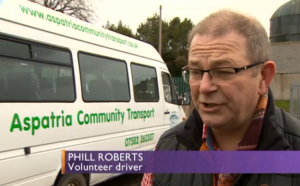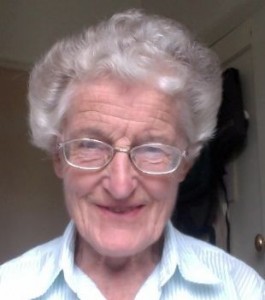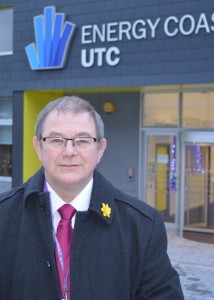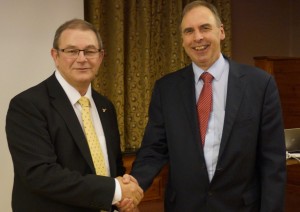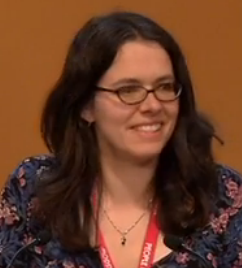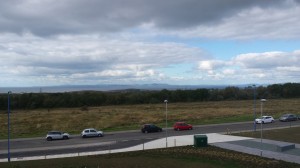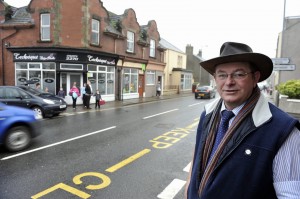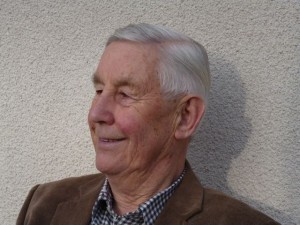Phill Roberts, parliamentary candidate for Workington, spoke out about community transport issues on The Sunday Politics this week. The episode is currently available here.
Our Place in the Global Economy: Elizabeth Barraclough in the Whitehaven News
‘It’s the Economy, stupid’ was Bill Clinton’s successful 1992 Presidential campaign message. And it is probably as true now that the economy is enormously important. However, controlling or forecasting the economy has become even more difficult.
We are living in an increasingly interconnected world. There are many global companies that have turnover greater than some national governments. Most of these companies have the simple aim of maximising profit for their shareholders within the law. Countries compete to provide a financial environment, particularly the tax regime, to attract such companies who provide jobs and income, eg Luxembourg and Amazon. So what should our next government do? As Liberal Democrats we believe we have to cooperate, particularly within Europe, to get a fairer tax regime for global companies.
At home we can aspire to reducing the national debt but in the global economy it is not wholly under our control so a proportionate approach has to be taken. The Liberal Democrat objective is to eradicate the current account deficit by 2017/18 so that we live within our income each year. The long term debt we would keep falling as a percentage of GDP.
It is the duty of government to protect and care for its citizens; this must include concern for fair wages for all. The Tories, funded by big business, believe in the trickle down effect to their employees from businesses that flourish but what we have seen is the divide between top salaries and wages expanding from 8 to 1 to 10 to 1. Liberal Democrats believe that we should help wage earners directly. So we pushed the coalition government to raise the initial tax level to £10,500. We would raise this again to £12,500 which is roughly what someone on the minimum wage could earn, still not reaching a fair wage. At the other end of the scale we believe the wealthiest should bear more of the burden and we would introduce a banded high value property tax on homes over £2 million.
Promises, promises but can we keep them? Liberal Democrats have learnt a lot from being in the coalition government and know how difficult it is to escape from recession into growth. What we are determined to achieve is a fairer society and to tackle the wider aspects of the economy by cooperation and agreement within Europe. We may be an island but we cannot be insular.
Elizabeth Barraclough
Executive member, Copeland and Workington Liberal Democrats
Phill Roberts to fight for Workington
News Release 13th Jan 2015
Copeland & Workington Liberal Democrats have selected Local Community Supporter and Chair of Copeland & Workington Liberal Democrats Phill Roberts to stand for the Workington Constituency in the forthcoming General Election
Liberal Democrat candidates have to undertake assessment and selection procedures plus attend Local Party hustings before being selected as a candidate.
Phill Roberts stood for the Workington Constituency in 1997 and is a previous Allerdale BC councillor. Phill is currently a Bromfield Parish Councillor and chairs a number of community projects including Aspatria Community Transport and Keswick carers.
Phill is also a passionate supporter of the campaign against inequality and the fight for a Living Wage.
Phill Roberts said
‘I am delighted to have been selected by the Workington Liberal Democrats to represent the Libdems at the 2015 election.
The Liberal Democrats have ensured that the country has had a stable government during very difficult financial times. Difficult decisions have had to be made in order to balance the country’s finances and the Liberal Democrats have ensured that the decisions made have been fair decisions.
We can’t however say that at this time we are all in it together when the mega rich get richer and the poorest in society get left behind.
Our society needs to ensure opportunity for all not just the few.’
ENDS
For further information please contact
Phill Roberts on 01697321609 or 07730284529
Or email [email protected] or twitter phillrobertsli1
Press Release from West Cumbria Liberal Democrats Annual Dinner
NEWS RELEASE
Copeland & Workington Liberal Democrat s
NUCLEAR PRESENTATION TO: Copeland & Workington Liberal Democrats by Barry Watkinson (Nuclear Development Director) Morgan Sindall
The Copeland & Workington Liberal democrats held their Annual AGM & Dinner at the
Hundith Hill Hotel on the evening of the 27th Nov 2014
Following the AGM Hundith Hill Hotel provided dinner for the Liberal Democrat members and guests.
Phill Roberts (Chair, Copeland and Workington Liberal Democrats) welcomed and introduced Barry Watkinson to the assembled members and guests for a presentation on the current planning and development for the new Nuclear Reactor at the Moorside Site adjacent to Sellafield.
Barry Watkinson informed the audience of the current planning and preparation for the Moorside site that was needed before work could actually start after 2017 including the infrastructure changes to roads leading to both the Sellafield and Moorside sites.
Barry provided an insight into the possible future developments of the Moorside site over the next 30 years and the scale of the current and future projects that would bring investment and jobs to West Cumbria
Barry’s vision went beyond current projects and provided an indication of the many possibilities and opportunities for the people of West Cumbria from the development of a National Nuclear Centre of Excellence based on the west coast of Cumbria.
He mapped out the considerable additional investment required in education and skills development that would be needed for Cumbria to take full advantage of the opportunities.
Following his presentation Barry was able to answer a number of questions from a very knowledgeable audience in regard to the generation of electricity from Nuclear Power including questions on nuclear waste and its safe storage.
Although Barry agreed with the Liberal Democrats that Cumbria’s geology may not be the best in the UK for safe storage of Nuclear Waste Barry was of the opinion that an engineering solution could be found to overcome the differences in geology and that any waste should be retrievable in the future.
Phill Roberts (Chair, Copeland & Workington Liberal democrats) in conclusion said
“I would like to thank Barry Watkinson for his presentation on future developments in the nuclear industry and all in the nuclear industry who have had the vision to prepare for this investment including the staff at UTC and the NNL in Workington
If the people of Cumbria and in particular West Cumbria are to take full advantage of all the opportunities in hosting the nuclear industry then we will need more investment in our infrastructure , roads, education and not least our hospital on the West Coast at Whitehaven
The safe storage of nuclear waste remains a challenge to all and wherever it is stored it must be retrievable. There is now general acceptance that Cumbria’s geology is in its self unsuitable for the development of a GDF and we therefore, as a party, remain opposed to the sitting of a GDF in Cumbria.
Whether an engineering solution can be found remains open to debate”
Ends
For further information please contact:
Phill Roberts 07730284529 or at [email protected] or on Twitter at phillrobertsli
Autumn Conference – Rebecca on Ofsted
West Cumbrian Liberal Democrat Liberal Democrat Rebecca Hanson continued the fight for sensible reform to Ofsted during the debate on public services in Glasgow this weekend. You can see her contribution here (2:10). This TV footage will be available for 1 month only.
Views on Scotland and the UK
The skies have cleared and Scotland is clearly back in view as part of the UK.
This photo shows the view from a classroom at the new Energy Coast UTC.
West Cumbrian Liberal Democrats fought to save the UK through traditional canvassing and through the use of traditional and social media. Rebecca Hanson took to using social medial. You can explore her views on Libdem Voice.
Phill Roberts went up to Scotland to campaign. Phill and Roger Putnam have been writing about the future of the UK in the local press. If you missed them they’re available below. Nick Clegg’s views are also well worth a read and are available here
Dear Sir
Scotland has now voted to remain part of our United Kingdom; however we should not underestimate the depth of feeling that brought us to the brink of Scotland going its own way.
A profound distrust of the current political and constitutional structures and our politicians over many years has now become entrenched in public opinion allowing nationalism to take the place of patriotism.
That such a sizeable minority of Scots voted Yes should be no surprise.
Already, vested interests in the Conservative and Labour parties are conspiring to block and undermine constitutional reform at a time when we should be listening to the call from our communities and regions for devolved powers from Westminster.
The call for devolved powers is however not new and some of the arguments for and against continue to be played out at a national and local level.
Devolution and the arguments for and against were a major issue within British politics in the mid 1990s resulting in John Prescott, then Deputy Prime Minister, attempting to devolve powers to the regions.
This attempt failed when the North East voted emphatically No albeit on a very low poll to the proposals. Will people be any more engaged in the debate following Scotland’s independence vote?
Some of the reasons that persuaded people to oppose devolution at the time included the cost of setting up new democratic structures and the possibility of having even more councillors at a time when the credibility of our democratic representatives were at an all time low; a position that has not improved greatly.
We certainly do not need more councillors, and constitutional reform should provide us with the opportunity to restructure our councils so that we have unitary authorities and strengthened parish councils.
Has Scotland and the Independence Vote refocused our belief in self determination and control over our own circumstances, tax raising, welfare, health, housing and economic development?
There is a widespread view that economic growth will only be balanced and sustainable with devolution of key economic powers and functions to our cities and that our cities will then be the drivers of economic growth.
However, would devolved powers to our cities and urban areas create further divisions and tensions, as indicated by the disagreements between our local councillors when rehashing old arguments about towns getting more resources than the villages and rural areas?
The current ambivalence to involvement in our democratic processes and distrust of our political representation will prove a considerable hurdle to getting the electorate engaged in the debate regarding devolving powers.
All people are calling for is a fair system that represents their wishes and feelings, not some system that supports party factional or vested interests.
Any model of devolution will be devalued undermined and not trusted unless we can support it with credible democratic structures and systems that people and communities can have confidence in.
There is therefore a strong argument that we should return to the call for devolution: an English Parliament and a federal system of governance. However, this time we should also guarantee that we have a fairer voting system where everyone’s vote counts and everyone feels included.
Simply giving more powers to English MPs does nothing to empower our local communities and regions.
Rebuilding confidence in our democratic systems and representation can only be achieved with an open and transparent process of devolving powers from Westminster that ensures Localism meets the needs of all in our communities and is not simply another “buzzword”.
We need to know your views. Please leave any comments on www.wcldfocusteam.org.uk where you will also find further information, or contact Phill on twitter @phillrobertsli1
Phill Roberts
(Chair, Copeland & Workington Liberal Democrats)
07730284529
Phill Roberts (Chair of West Cumbria Liberal Democrats) writing in the Whitehaven News today
Prior to, during and after the recent elections much was reported about the demise of the Liberal Democrat party however I can assure your readers that the Liberal Democrat Party is alive and kicking and continuing the fight for a fairer, stronger and more equal society
Liberal democrats are committed to fighting for a fairer stronger economy and this includes addressing massive inequalities in our financial, health and education systems.
Income inequality is a disaster for everyone in society and there is evidence that we have become a low paid bargain basement economy over the past decade.
Liberal democrats are therefore taking steps to rebalance the economy when they can get the legislation past the conservatives!
Liberal Democrats in government have ensured that the tax threshold has been increased to £10,000 lifting 2million low earners from paying tax completely and giving a sizable tax cut to another 22million putting up to £800 back in peoples pockets however there remains much to be done to ensure that we are “all in this together”!
A society that gives huge pay rises to bankers and executives whilst freezing real wages for lower paid people is simply unfair and unjust. I would therefore urge people, as many Liberal Democrats already do, to support the campaign for a living wage.
Liberal democrats have also ensured that children between the ages of 5 and 7 will benefit from free Schools meals from September 2014 saving families up to £430 per child.
Liberal Democrats have already made it possible for all 3 and 4 year old children in Cumbria, and throughout the country, to have up to 15hrs free education, in addition the £2.5 Billion Pupil premium has helped those children who need extra support in school. School leavers are benefiting from the creation of 1.8 million apprenticeships since 2010.
Many Liberal Democrats, including Tim Farron, are also fighting to review and scrap the spare room subsidy, known as the bedroom tax. Clearly we need a National Housing Policy that addresses the needs of local communities.
On a more positive note Liberal Democrats have ensured up to £250 for carers to have a break from their caring responsibilities. Carers are clearly on the Liberal Democrat agenda for future support
There are many other areas where the Liberal Democrats in government are working on the behalf of communities to ensure a fairer stronger society, come and join us!
Find out more at wcld.focusteam.org.uk
Phill Roberts (Chair, Copeland & Workington Liberal Democrat Party)
A living wage in Cumbria
It’s not too late to sign the online petition for a living wage in Cumbria. Please sign up now:
You are invited to a garden party
A strange compulsion
It was a bold innovation when this newspaper invited weekly contributions from members of the main political parties. I think these have all been of interest. Writers have not simply trotted out the political dogma of their own parties, but have reflected on what matters to them as individuals and what they personally consider important issues for our local community. Indeed I often find myself agreeing with the views of contributors from other parties.
What is it that drives people to become politically active; to support a particular political tribe?
Political involvement seems to many to be a strange, even bizarre way of spending one’s time. Politics is seen by some as corrupt or self-serving, and politicans are denigrated for incompetence or dishonesty.
Yet the truth is that political activity is an inevitable and necessary part of life; without it, our society would collapse into anarchy.
I myself fell into this world almost by chance. Frustrated by the dogmatism of Thatcherism and appalled by the antics of the ‘loony left’ I welcomed the emergence in 1988 of a new third force, with a belief in sensible, moderated market realism allied with a strong sense of social responsibility and a powerful green and internationalist ethic. I joined the Liberal Democrats and to my surprise soon found myself a parliamentary candidate both for Westminster and for Europe. From these experiences I learned some valuable lessons.
First, I discovered that the goals of most politicians are much the same. We aspire to similar ends, even if the means of achieving them differ. Unfortunately, our present system highlights the differences rather than the areas of agreement. Most politicians enter this much-disparaged field with ideals, to change society for the better. Perhaps if the Westminster parties could learn to work together wherever possible we might make more progress in doing so. The broadcast yah-boo nonsense of PM questions stands in stark contrast to the constructive work of the all-party select committees.
Secondly, every political party is a collection of individuals with differing ideas and priorities. These parties are not simply of one mind; they are ‘broad churches’ in which people have to listen to each other and to compromise. One of the special features of the Lib Dems is that policy-making is done in open discussion at conference or in special consultations. Members are actively encouraged to express their own ideas.
Thirdly, democracy, with individual entitlement to vote, remains the best system on offer, despite its imperfections. If you don’t believe this, if you are cynical about our political democracy and your ability to influence events, then show me a better system.
My own advice to people as we approach the election period is: take part; be heard; make your opinion count; and play an active, positive part in the political process. We will all be the losers if you do not!
Roger Putnam in the Whitehaven News. May 1st 2014

